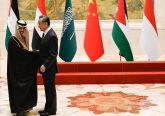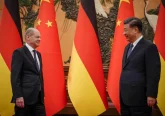Recent revelations about the alleged misuse of the personal data of millions of Facebook users have dominated international headlines. Reportedly, Cambridge Analytica exploited loopholes in Facebook’s privacy settings to create psychometric profiles for targeted political influence campaigns. Thus far, available evidence suggests that the firm was active all over the globe, but not directly involved in Australian politics. So, why has the Cambridge Analytica scandal got alarm bells ringing, on the opposite side of the world, in Canberra?
To understand the significance these events for Australia, one must understand our geopolitical position in the Pacific. Australia has long thought of itself as the United States’ younger sibling. In 2003, US President George Bush memorably labelled Australia America’s “deputy sheriff” and this nomenclature was implicitly reciprocated by John Howard, Prime Minister of the day. This anecdote aptly reflects the nature and strength of the US-Australia relationship fifteen years ago.
However, in the interim, US influence in the Pacific has waned and the influence of China has grown. In respect of these changes, Australia has had to negotiate a perilous balance between security cooperation with the US and economic ties with China. Indeed, it is fair to say that this dichotomy underpins most of Australia’s recent foreign policy decisions.
Any collision of these two global powers concerns Australia directly. Trump’s reductionist doctrine leaves us exposed to Jinping’s expansionist agenda while raising the stakes of our balancing act. At minimum, Australia looks likely to bear the rapidly increasing costs of regional security, which has reignited interest in “Indo-Pacific Cooperation” and ASEAN as potential offsets.
Surprisingly for a country that finds itself in such a sensitive and potentially conflictual geopolitical context, Australia has welcomed Chinese investments and interests in recent years. In 2016, China unpegged the Yuan from the US dollar which prompted a degree of capital flight to Australia, and Chinese landownership in our country increased tenfold within a year.
Yet, not all such investments have been benign: a Chinese property developer with connections to the Communist Party, Huang Xiangmo, provided gifts and money to Australian Senator Sam Dastyari, who advanced Chinese interests in the public sphere and provided Xiangmo with counter-intelligence advice.
These efforts and more are documented by Clive Hamilton, in his long-awaited book Silent Invasion: China’s Influence in Australia.The controversy surrounding the book’s publications and ensuing debates show an increasingly conflictual debate, which has not lived up to the standards of open and honest discussion of the presented facts. Three publishers dropped the book after receiving warnings from the Chinese Government, and it was at one point under consideration to receive parliamentary protection for publication.
Hamilton’s observations echoed across the Tasman around the same time that Anne-Marie Brady’s paper titled Magic Weapons: China’s political influence activities under Xi Jinping highlighted a similar relationship between Chinese investment and political subversion in New Zealand.
Despite the attention these publications have brought to the issue of Chinese influence in Australia, the actual contents and revelations contained in them have often fallen on deaf ears. Beyond the headlines, few have bothered to read these and other studies of Chinese influence. Especially online, debates been dominated by wild speculations, unsubstantiated claims, ad hominem attacks and even occasional fake news.
While unfortunate, this should not be wholly surprising. A study from the Massachusetts Institute of Technology recently observed that fake news is more readily consumed than the truth; An article in The Conversation reported that many Australians cannot confidently recognise fake news, and researchers from The University of Canberra found that over a third of Australians used Facebook to get their news. With such heavy reliance on non-traditional sources of information, average citizens might be in danger to becoming victims not only to fake news but strategic campaigns of manipulations.
A lack of shared notions of the “truth” and a vulnerability to highly sophisticated influence campaigns leveraging vast amounts of data paint a worrying picture of democratic integrity in our country. As research consistently shows, we crave and more easily accept information that fits our cognitive biases. Firms like Cambridge Analytica have claimed to have successfully demonstrated how this desire can be manipulated to influence citizens and their intentions.
While Cambridge Analytica might not survive the blowback from the recent revelations of its sinister activities, the example it has set is likely to persist. Such a model of influencing public sentiment and policymaking would be invaluable to China, who might look to influence Australia’s positions on sensitive regional issues like the South China Sea or militarisation of Vanuatu.
Even though, no evidence has come to light, thus far, that Cambridge Analytica has been actively engaged in Australian politics, the scandal has revealed a key risk that Australian policymakers are acutely aware of. In the context of a potentially further intensifying geopolitical rivalry between the US and China – stuck between a rock and a hard place – Australia might become particularly vulnerable to power struggles playing out in the cyber domain. As the Cambridge Analytica scandal has revealed: unprepared democracies will be at a distinct disadvantage when personal data gets (ab)used in political influence campaigns in highly polarized contexts.






